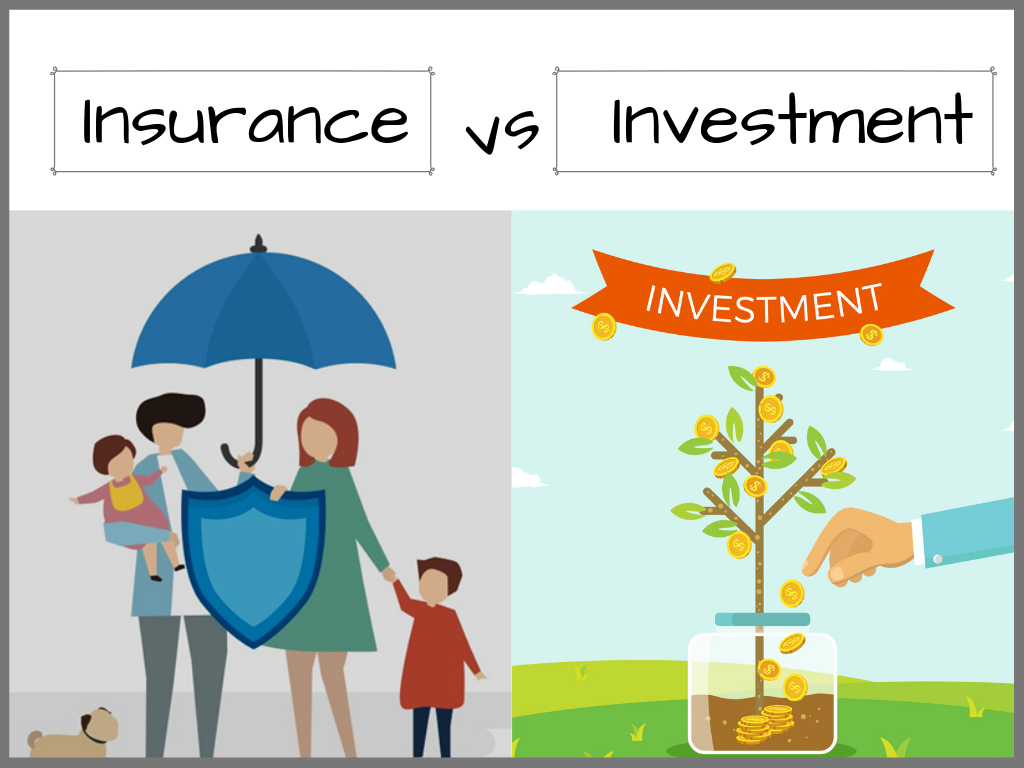Home > Blog > Blog Detail

When we reach a certain age, we must decide between Investment Vs Insurance. We get such advice that we should start investing now. Is insurance taken to cover life or not? The dilemma now is Investment Vs Insurance means whether to begin investing initially or take out Insurance. Who should be given priority? Both options have advantages. Some feel that investment should come first, while others believe Insurance is the better option for protecting your life.
This is a contentious issue. However, you must read this article to clear up any confusion about these two topics. In which the advantages of both investment and Insurance are discussed. So that you are clear about who you want to prioritise!

The early investment allows you to gain financial knowledge and discipline. Starting early, you can learn about various financial vehicles, such as Mutual Funds, stocks, bonds, Insurance, and estate planning. This knowledge will assist you in making good investment selections as you go through life. Most people cannot maintain a regular budget, so by beginning investments, they will become more disciplined in saving and investing in the future, build a larger corpus in the long run and improve their spending habits.
Read More: Diversified portfolio for Gen Z, Millennial, And Gen X
Compounding can significantly impact your money if you have long-term financial goals. By starting early, newcomers can reap the excellent benefits of the investing goal, allowing their long-term investments to build wealth over time considerably, thanks to the power of compounding.
For example, suppose a person starts investing through SIP at 25 with Rs 5,000 if that person invests the same amount for 30 years. Then he funds Rs 18,00,000 for this period, and after 30 years, the person receives a whopping Rs 1.76 Crore.
Understanding your individual risk tolerance is essential for successful investing. Risk tolerance is the amount of risk that you can tolerate. It varies considerably based on income, spending, responsibilities, and outlook. People who have a large number of dependents, debts, or bills have a reduced risk tolerance. On the other hand, someone with hereditary wealth may be willing to take on more risk. Having a higher risk appetite as an early investor can be helpful when researching investing opportunities. By thoroughly examining the industry, you can better comprehend and boost your chances of accomplishing your long-term goals.

Many people who want to retire early define it as retiring in their 40s, 50s, or even earlier. They wish to withdraw to travel, devote time to hobbies, or not work. Beginning your financial path early can lead to early retirement, allowing you to live out your objectives and goals with acquired cash. Investment can be a valuable tool in accomplishing this goal.
You’ve probably observed that the current inflation rate is 7%. As a result, life is getting more expensive than ever before. Everything will be more expensive, from grocery shopping to fueling your car to get to work. You may believe that investing is too hazardous, but failing to invest some money for the benefit of the future is far riskier. You can also begin your Rs 500 investment with a modest amount by investing a fixed monthly, weekly, or quarterly via SIP.
Read More: The Innovative Way to Invest in the Stock Market
If you’re new to the workforce, have minimal family responsibilities, and want to secure your financial future, it’s essential to consider the value of Insurance. A term plan should be a priority as it protects your family’s security.
Term plans are less expensive, especially for young people. Purchasing a term plan early implies paying a lesser premium. Premium payments can be made monthly, annually, or semi-annually. They are buying a term plan earlier in life results in lower premiums than later in life.
For example, if you take a term policy of 50 lakhs at 30, your premium will be around Rs 12,000 to 15,000.

A term insurance policy pays out a death benefit to the policyholder’s family only if the policyholder dies during the policy term. However, for various reasons, many people cannot get a term plan with a substantial life cover and safeguard their family with an appropriate sum insured. As a result, the accidental death benefit in term insurance is the ideal option for the policyholder to ensure that their loved ones receive an additional rider sum assured on top of the base sum assured if the policyholder dies in an accident.
Accident insurance policies assist when life’s most unexpected events occur. The recipient of an accidental death insurance policy receives an accidental death benefit. The accidental death benefit rider in term insurance is optional in most term insurance policies. This rider supplements the plan’s base coverage by providing an additional rider sum assured to the policyholder’s nominee if the policyholder dies in an accident. According to the policy terms and conditions, this rider can be applied during the insurance purchase or the policy anniversary. This rider can be added for a small fee in addition to the base rates.
If you have dependents, financial commitments such as EMIs, or if you are at risk of an accident, you should seriously consider obtaining term insurance.
If you have dependents, financial commitments such as EMIs, or if you are at risk of an accident, you should seriously consider obtaining term insurance.
People used to live in combined families, which made controlling finances easier. However, as times have changed, families have shrunk, and only one breadwinner is in the house. Both current and future breadwinners must invest in a long-term strategy to ensure a stable future and prepare for unexpected circumstances. Obtaining a long-term plan early on makes dealing with any future hiccups easier.
Now consider the tax advantages of a term plan.
Term planning is one approach to reducing your taxes. The policyholder might minimise tax liability by acquiring term insurance with a premium refund. Section 80C of the Income Tax Act of 1961 allows for a tax deduction of up to Rs 1.5 lakh per year on policy premiums. The term plan payout is excluded from income tax under Section 10 (10D) of the tax rules.
Because Section 80D is concerned with health insurance if you need to claim a tax deduction for your term insurance policy, look for any health riders you have added to your policy. Even if you are still attempting to figure out the deduction, you can ask your insurance provider and a financial counsellor for assistance.
Before investing, be sure you’ve taken care of more immediate financial needs like paying off high-interest debt and building up an emergency or rainy day fund. If you’ve got that covered, then start to think about investing. On the other hand, Insurance is a valuable financial instrument. It can help you live with fewer anxieties, knowing that your family will receive financial aid if a calamity or accident occurs.
Regarding prioritizing, the debate between Insurance and Investment is ongoing. While you can choose either based on your immediate needs, it’s essential to consider the unique benefits, as both are necessary for long-term financial planning. You still have time! Just protect your future and family.




